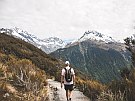adaptation
Physical and behavioural changes over time to fit new environments or conditions.
adventure
An exciting or unusual experience that may involve some level of risk and have an uncertain outcome.
biodiversity
Many different types of plants and animals.
catchment
The entire area from which drainage water is received by a body of water such as a river or swamp.
ecology
The study of living things in relation to each other and to where they live.
ecosystem
A community of organisms together with the environment that they inhabit and depend on.
elevation
The height in metres above mean sea level.
endangered species
A group of animals that is declining in numbers and may become extinct soon.
endemic
Plants and animals that live only in New Zealand.
expedition
A journey or voyage undertaken for a specific purpose or goal with no certain outcome.
farm
An area of land used to grow crops and/or raise lifestock.
fauna
Animals of a particular area.
flora
Plants of a particular area.
food chain
An arrangement of organisms in a community according to which organism is eaten or eats another. Food chains always start with a plant (or plants).
food web
A system of food chains linked to one another.
groundwater
Water found beneath the surface of the land.
habitat
Living place of plant or animal.
hauora
The physical, mental and emotional, social, and spiritual dimensions of well-being.
hiking
Going on long walks in the countryside.
intentions form
A form which is filled out to inform people of where in the outdoors you are going and when you are expected to return so a rescue can be organised if you do not return.
inter-montane
Lying between mountains.
introduced
Brought into the New Zealand environment.
invertebrate
Any animal that does not have a spinal cord at any stage of its life such as worms, insects, spiders, crustaceans and molluscs.
mammalian predators
New Zealand’s native species have been decimated by the introduction of a variety of predatory mammals including rats, cats, possums and stoats.
migration/migrate
A seasonal journey from one region to another.
mustelid
Stoats, ferrets and weasels.
National Park
A reserve of natural land owned by the government set aside for environmental protection and recreation.
native
Found naturally in one country but may also be found naturally in other countries e.g. fantails are found in New Zealand but also in Australia.
niche
How an organism makes a living. It describes things such as an organism's life history, its habitat, its position in a food chain and food web and its geographic range. No two species can occupy the same niche in the same environment for a long time.
nutrients
Elements or compounds essential as raw materials to sustain life.
Personal Locator Beacon (PLB)
A device used to transmit an emergency distress signal which allows people to be located using GPS co-ordinates so they can be rescued.
pollution
The presence of unwanted matter or energy (heat, noise, etc.) that have harmful effects on living or non-living matter.
sub-alpine
The area above the treeline but below the alpine rocky zone where very little grows.
sustainable
Using natural resources without destroying the ecological balance of an area.
tramping
The New Zealand term for hiking.
vertebrates
Animals with backbones.
wind chill
A measure of how cold it feels when the affect of the wind is taken into account.




